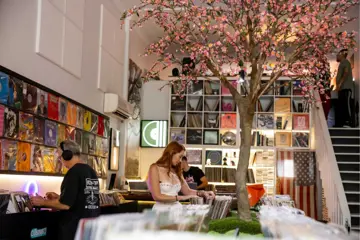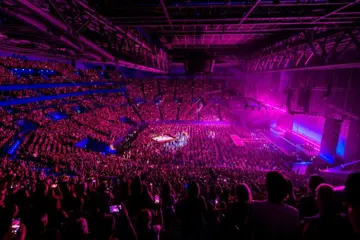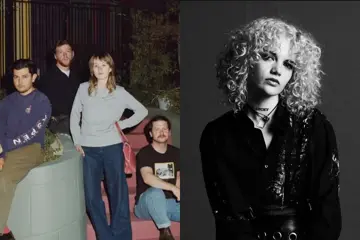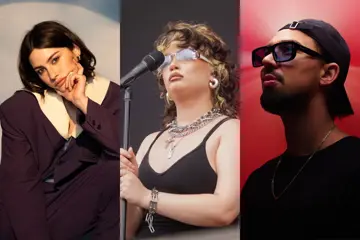 Ali Barter
Ali BarterThe best thing about music, says Ali Barter, is that songs can take on a life of their own. What an artist's intention was when penning lyrics is personal - once those thoughts and emotions have been let loose it's up to an audience to interpret meaning in a way that fits them.
When Barter wrote the anthemic single Girlie Bits she was on her honeymoon, sunning herself on a beach in Goa — a situation so idyllic it's difficult to reconcile with such a charged song. "I was feeling really uncomfortable sitting on the beach in my bathers because I was really uncomfortable in my body. I had the words 'girlie bits' in my phone — I was thinking about fleshy bits: beautiful rolls and gorgeous curves and things like that, and how much I love them on somebody else but how much I hate them on myself, and how sad that is, you know?" she explains. "I'd read an article by Bethany Cosentino from Best Coast and she's talking about how, when [reviewers] review her shows, they always make a comment about the fact that she's not smiling, and how fucking annoying that is. No one ever says that about dudes — if you go and see a male band play and they're not smiling, you just go, 'Oh, they're so serious and brooding and blah-blah-blah,' but you go and see a girl play, and she's not smiling, and the reviewer goes, 'She looks grumpy,' and it just gives me the shits."
The chorus refrain, "You don't understand what it's like to be a man" — something an ex-boyfriend had said to her in the heat of the moment (or lack thereof) — was also playing through her head that day. "It was one of those moments where you're in a long-term relationship and one [person] wants to have sex and the other person doesn't because they're tired, or whatever the circumstances are, and he said, 'You just don't understand what it's like, babe. I'm a man and I have these urges and I need to have sex,' and I was like, 'Oh, shut up!' The thing is, when people stay stuff like that, you get guilted into doing it and it's a horrible reason to have sex with somebody." Barter went back into her hut, picked up her guitar and wrote Girlie Bits in ten minutes.
"When people stay stuff like that, you get guilted into doing it and it's a horrible reason to have sex with somebody."
While the track is often interpreted as a shimmery 'Fuck you!' to misogyny and male double standards, Barter explains that it's more of a "conversation starter" about gender expectations — both male and female. "That's the beautiful thing about a song — it's open to interpretation and other people can take their own meaning from it," she muses. "I'm married to a beautiful man and we talk about the pressure on men to be men, the sense of expectations and pressures and reading the statistics about suicides, especially male suicides — that is a really virulent thing... I love people's response to [Girlie Bits]; it completely blows me away every time. This song is meant to be inclusive and it's meant to be a conversation starter. It is so nice, because women identify with it but men also identify with it... I think it's a song about wanting to be understood. It doesn't have to be a song just for women. We can ask those questions and sing them out loud."
Don't miss a beat with our FREE daily newsletter
Melbourne-based Barter grew up in the jungles of Papua New Guinea and Cairns on a heavy diet of Aimee Mann, Joni Mitchell, Patsy Cline, Fleetwood Mac, Judy Collins and other powerhouse female singer-songwriters. "Most of them were women singing their story, so that was really powerful for me... I had two CDs that I played equally as much - Jagged Little Pill by Alanis Morissette and Spice Girls," she laughs. She sang with the Australian Girls Choir until she was 16, but dropped out when her teen priorities shifted from rehearsals to partying, friends and generally running amok. It wasn't until she was 24, following the death of her father, that she began to seriously pursue music. She made a pact with herself to perform at three open-mic nights and write one song every week ("just to hack away and play my terrible songs because I needed to get experience up"). Then, in 2012, award-winning Melbourne producer Steve Mowat approached her to record an EP, Trip ("I didn't even know what an EP was!") and the records that followed — Community (2014) and AB-EP (2015) — have been produced by her husband Oscar Dawson (Holy Holy).
"Women identify with it but men also identify with it... I think it's a song about wanting to be understood."
Her debut LP A Suitable Girl — taken from Vikram Seth's novel A Suitable Boy — is awash with Barter's scintillating soprano, blistering guitar smattered with a little grunt and grunge, and nuanced vignettes. Tracks move between frank authenticity on Cigarette to raw vulnerability on Tokyo, riding the ebb and flow of Barter's cycles of emotion — craving affection, vehemently protesting condescension and inequality, meditating on pain and power. "I feel like it's sort of the story of my late 20s. That was a time where a lot of things change; there's a lot of expectation and you're entering into a lot of new relationships and new roles, and there's expectation not only from other people but also of yourself," she explains.
"I had to really write it out because I didn't know what to do with it; I just had to be really, really fucking honest about it. And that's why these songs are so open and on the nose, because that was my process — I had to say it out loud to let it go. I have a lot of really strong female friendships in my life and, by saying it to them, I realised they were feeling similar things. A lot of it was stuff that I think — as women coming into this stage of our lives, early 30s, late 20s, where we think we should be something, we should act a certain way and there's a lot of 'should' whereas we need to say this stuff out loud: 'This is what I feel and that's okay.' And so that's what this album is for me."
Barter is thinking about doing more writing now that the album is out in the world and, while she's already picking up a guitar and tinkering with new material, she's keen to write more articles following the success of her piece for Junkee last year, which called out the gender imbalance of the curriculum at her uni. "For six weeks [we learned about] 12 artists, and none of them were women. We were halfway through the semester and I just thought, 'This is so fucking shit'," she frowns. "I was the only girl in the class and I just sat there thinking, 'This class isn't directed at me. I'm a female musician, but I'm not learning about female musicians or their stories'."
When she posted a Facebook status expressing her concerns, she was met with an adverse reaction from the institution. "The school reacted quite badly and told me to take it down, and hounded me with emails until I did take it down, to the point where I spoke to my friend who's a lawyer and was like, 'What do I do, this is shit?' In the end I had to take it down, but I was still angry. So in the end I had to write this piece. I didn't make it up, just because I took it down and just because the school deny that what I said was true. It was true. And I think it's wrong; more than wrong, I think it's boring!"















